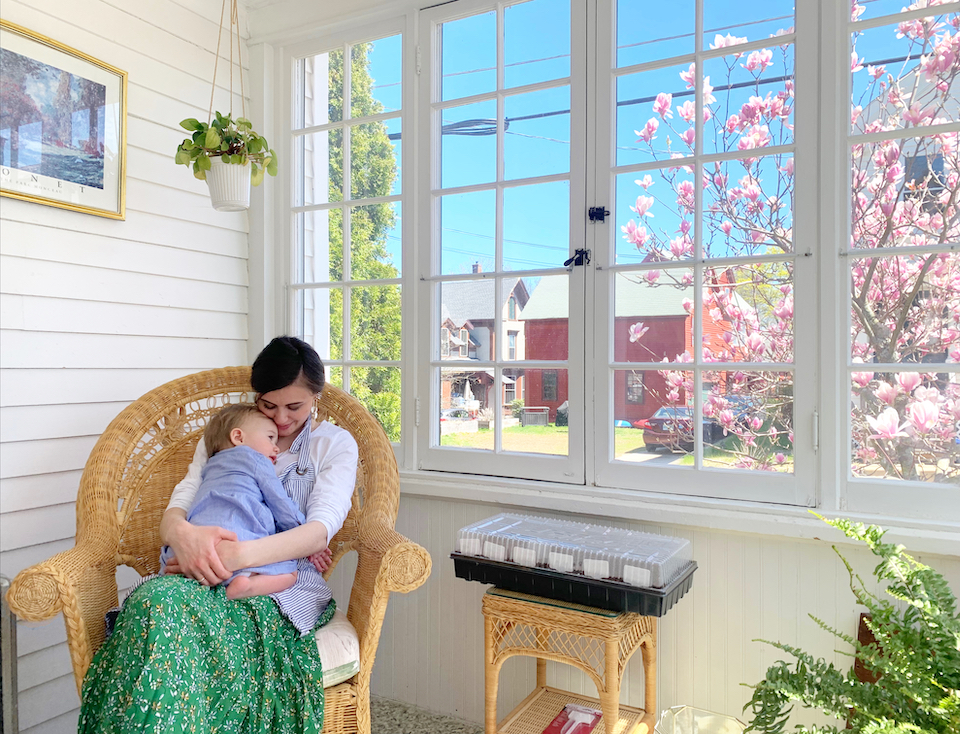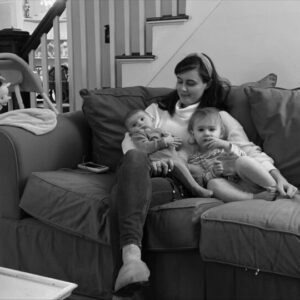A few months after my daughter was born, I remember turning to my husband one autumn evening and saying, “You know, I’m just realizing that this is the first year of my life since I was young when I haven’t been in school.” It was certainly an awakening for me as I realized that before my daughter was born, the rhythm of my life had been consistently dictated by classes, assignment deadlines, and exams. As someone who went straight from college to graduate school and only finished my final assignments a mere few days before giving birth to my daughter, I didn’t have much time to prepare for the transition from full-time student to full-time mom. The sudden realization I had that evening got me thinking about how much of my life really didn’t prepare me for the work I was currently doing as a mother. If it wasn’t for the experience of being a part of a large family, the countless nannying and babysitting jobs, and the incredible example of my own mother, I would have felt far from equipped for this new role. Despite the experience I did have, I struggled as motherhood overturned many of the rhythms and routines I had come to thrive within: the expectation of grades and feedback on my work, the ability to work uninterrupted for long periods of time, and the freedom to create my own schedule. Now, as a mother, there is no one to tell me whether I’m checking all the boxes or passing the class. My schedule is subject to nap times, meals, laundry, or a sick toddler who just needs to cuddle.
This realization has led me to reflect on how our society tends to only prepare women to climb the professional totem pole of the career world. A life of professional and public accomplishment, impressive resumes and high-paying salaries is glorified as “the dream.” Very rarely will a woman hear that running a home or raising children might actually be her full-time job at some point. This isn’t to say that higher education or professional experience isn’t a valuable asset for women and mothers (research actually shows that it is), but why is it that a dynamic career is portrayed as the mark of a successful woman? The work of motherhood is simply not something that our society at large sees as essential or impressive.
So why is this a problem?
This lack of reverence for motherhood carries with it significant consequences because motherhood is the seed from which society blossoms. Jordan Peterson, in a YouTube video titled, “Women at 30”, points out that the mother- child relationship must become a foundational part of our society’s value system, since without them, there is no society. If mothers are not encouraged in their work, the number of children will diminish and the whole of society suffer. In the role of mother, women are given a unique glimpse into the unrepeatable value of the human person. They come to know their child as no one else can know them, to understand their worth with a divine kind of vision that is irreplaceable. This truth carries with it not only astounding beauty, but evolutionary weight. How else can we expect humanity to thrive, let alone survive, without the cultivation of authentic motherhood? Motherhood that is self-sacrificial and humble, a confident outpouring of one’s life for another.
So how do we combat this tendency to undermine the work of mothers? I believe it requires a view of motherhood, not only as a role or responsibility, but a form of education for women. Now you might be asking yourself, motherhood as an education? That sounds strange. The experience of motherhood is so different than school, as I realized when I transitioned from student to mom. But hear me out here. When I refer to motherhood as an education, I mean in the sense that it is a deeply engaging transformation that enables human life to flourish. Within the work of motherhood, we see women develop a host of virtues and skills that simultaneously teach children the art of living.
The self-sacrifice of a mother that begins from the conception of her child within the womb allows her to serve her child with a love that helps them flourish, living in the safety of her care until they have gained the independence to live on their own. Her attentiveness to her child’s needs allows her to understand her child as no one else can, to know their weaknesses and strengths so as to guide them in the cultivation of their talents for the good of their family and later on, the greater society. Her gentle and tender heart speaks to the great dignity of the human person, teaching her children the respect they owe to all men. Her cooperation with the work of creation grants her the creative ability to fashion a home for her children’s growth and development, a safe dwelling where all their needs are met. And ultimately her perseverance and courage within the difficulty of daily sacrifice and constant care for another builds up a legacy of love through the virtues of her own children and the families they go on to build. In summation, through the words of G.K. Chesterton,
“How can it be a large career to tell other people’s children about the Rule of Three, and a small career to tell one’s own children about the universe? How can it be broad to be the same thing to everyone, and narrow to be everything to someone? No. A woman’s function is laborious, but because it is gigantic, not because it is minute. I will pity Mrs. Jones for the hugeness of her task; I will never pity her for its smallness” (Whats Wrong with the World, 1910).
We often equate motherhood with childcare, viewing the mundane, yet essential tasks of feeding, clothing, diapering and overall “supervision” as a handful of rather dull activities that must get done. Some may even argue that professional childcare providers could do a better job at raising children than mothers since they know more about human growth and development than the average mom. This view paints motherhood as a replaceable position, a collection of duties rather than a powerful relationship that transforms and shapes the lives of many. As Chesterton says, motherhood is not a small task but an enormous one.
In light of this understanding, another insight I have pondered within my first year of motherhood has been the uniquely personal expression motherhood takes within each individual woman. In addressing the dilemma of our society’s lack of respect for motherhood, I am not claiming that a woman who has a career or role in the professional world is doing something wrong by not devoting herself fully to her family. Many mothers often need to work or have specific callings within the public life and modern society offers many opportunities for women to balance work and motherhood in amazing ways. Every woman has a unique personality and temperament that does not always suit the stay-at-home-mom life. The key to the question of whether to work or not as a mother lies in the intention. If the only reason a woman chooses to work outside the home is because of external pressure to pursue a career or “have it all,” then how can she expect her family to thrive if she is subconsciously placing professional success above the nourishment of the children within her care? Once a woman enters the role of motherhood, the raising of her children naturally becomes her primary vocation, above any professional calling. This is because the professional world in essence exists for the flourishment of the family and not vice versa. Without a reverence for the human person, society crumbles because it does not recognize its own purpose.
Even though I have only been a mother for a brief amount of time, the experience so far has taught me greater lessons than any I have learned during my school years and granted me deeper insights than anything I could even write about. Yet it has also demanded a more challenging kind of work than anything I have ever done- a work that requires not just physical and emotional labor, but spiritual growth as well. Whether you are a mother or not, I hope that these musings inspire you to reflect more deeply on your own motherhood or the work of mothers around you and encourage them wherever they are in their education as mothers, raising their children in the school of life.




